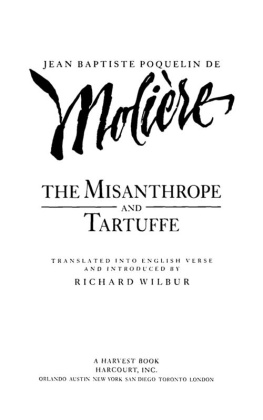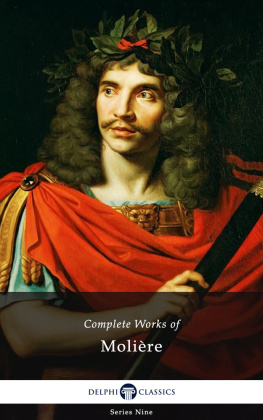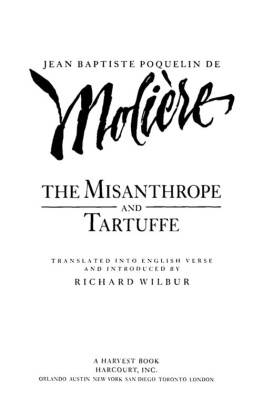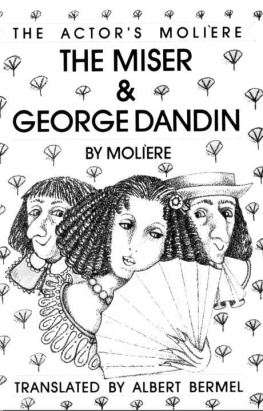
Molieres Plays: The Miser
In Contemporary American English


Contents
Introduction by Marciano Guerrero
Molire (1622 1673), whose original name was Jean-Baptiste Poquelin was a French actor and playwright, and by all accounts, the greatest of all writers of French comedy.
Although the much entrenched authorities both sacred and secular of 17th-century France often conspired against him, Molires genius finally emerged to win him acclaim.
Although comedy had a long history before Molire, he has the distinction of inventing a new style that rendered obsolete the traditional visions. In that, he contrasted the true to the false, the plain to the pedantic, and the good to evil nature.
Like Shakespeare, Molire was an actor who understood acting, technique, props, lighting, and all the phases of production. By dramatizing the reasonable and the absurd, he animated what today seem impossible situations.
In short, Molieres plays are evergreen plays that never become too old to be presented to emerging generations across the centuries.
About The Miser
Molire's chief goal in The Miser was to satirize a class of Parisians who amassed fortunes through avarice and usury. Molire achieves his goal through witty, cutting dialogue that ridicules the central character, Harpagon.
Moliere continued the study of Usury which was treated as far back as 1494 in Brant Ship of Fools.
Through the inner springs of Harpagon a paragon of the miser and the avaricious money lender Moliere delves into the psychology of this repulsive literary prototype. Balzac continued the study of such characters; especially in his novel Gobseck . Yet, this characters seems to appear in all societies: Shakespeares Shylock, and Dickens Scrooge in England, and Perez Galdoss Torquemada in Spain.
When Valere pronounces a maxim found in Ciceros treatise on rhetoric, Ad Herennium frugality should reign in the meals which one offers; and that according to the saying of an ancient, we must eat to live, and not live to eat, Harpagon is all ears and rejoices in its repetition, and wishes to commit it to memory .
Harpagon, despite all his avaricious sins, never loses his passion for money, finding redemption in the peculiar love he shows for his family. So, in Molieres play he isnt the heartless and cruel creature, but a character that finds his own humanity in the love of his daughter.
THE MISER
CAST OF CHARACTERS
Harpagon, father to Cleante and Elise
Cleante, Harpagons son, Marianes lover. Valere, son of Anselme, Elises lover. Anselme, father to Valere and Mariane . Master Simon, agent.
Master Jacques, cook and coachman to Harpagon.
La Fleche, Cleantes valet.
Brindavoine, Harpagon lacquey
La Merluche, harpagon lacquey
A Magistrate and his Clerk.
Elise, Harpagons daughter, Valeres sweetheart.
Mariane, Cleantes sweetheart, beloved by Harpagon .
Frosine, a designing woman.
Mistress Claude, Harpagons servant.
The scene is in Paris, in Harpagons House.
ACT I
Scene I.Valere, Elise.
Valere. Whats going on, charming Elise! You are growing melancholy, after the kind promises which you were good enough to give me of your love! Well! I see you sighing in the midst of my joy! Tell me, is it regret at having made me happy? Buyers remorse for the engagement my affection has induced you?
Elise. No at all, Valere, I cannot repent of anything that I do for you. I feel myself attracted to it by too sweet a power, and I have not even the will to wish that things were otherwise. But, to tell you the truth, our success causes me uneasiness; and I am very much afraid of loving you a little more than I ought.
Valere. Really! What is there to fear, Elise, in the affection you have for me?
Elise. A lot! a hundred things at once: the anger of a father, the reproaches of my family, the censure of the world; but more than anything else, Valere, the change of your heart, and that criminal coolness with which those of your sex most frequently repay the too ardent proofs of an innocent love.
Valere. I see! Do not wrong me by judging of me by others! Suspect me of anything, Elise, rather than of failing in my duty to you. I love you too deeply for that: and my affection for you will last as long as my life.
Elise. Ah, Valere, everyone talks the same way! All men are alike in their words; their actions only show them to be different.
Valere. Since actions only can show what we are, wait then, at least, to judge of my heart by them; and do not search for crimes because you unjustly fear, and wrongly anticipate. Please do not kill me with the sad blows of an outrageous suspicion; and give me time to convince you, by a thousand proofs, of the sincerity of my affection.
Elise. How easily we are persuaded by those we love! Yes, Valere, I hold your heart incapable of deceiving me. I believe that you truly love me, and that you will be constant. I will no longer doubt of it, and I will limit my grief to the worries of the blame which people may utter against me.
Valere. But why this dread?
Elise. I should have nothing to fear, if everyone could see you with the same eyes I look upon you; and in your own person I see sufficient to justify me in what I do for you. For its defense, my heart pleads all your merits, supported by the help of a gratitude with which Heaven has bound me to you.
At every moment I call to mind that great danger which first made us acquainted with each other; that wonderful generosity which made you risk your life in order to snatch mine from the fury of the waves.
T hose most tender attentions which you lavished upon me, after having dragged me out of the water, and the continuous homage of that ardent affection, which neither time nor obstacles have been able to discourage, and which, causing you to neglect relatives and country, detains you in this spot, and keeps your position unrecognized all on my account, and has reduced you to assume the functions of servant to my father, in order to see me.
All this causes, no doubt, a wonderful effect on me, justifying in my own eyes, the engagement to which I have consented; but it is not perhaps enough to justify it in that of others, and I am not certain that the world will enter into my sentiments.
Valere. Of all that you have said, it is only by my love that I pretended to deserve anything from you; and as for the scruples which you have, your father himself takes but too good care to justify you before the world.
T he excess of his avarice, and the austere way in which he treats his children, might authorize strange things still.
Excuse me, lovely Elise, for speaking so before you. You know that, on that subject, no good can be said. But in short, if I can, as I hope I shall, find my relatives again, we shall have very little difficulty in rendering them favorable to us. I am impatient to receive some news from them; and should they be delayed much longer, I will myself go in search of them.
Elise . Ah! Valere, do not stir from this, I beg you; and think only how to ingratiate yourself with my father.
Val ere. You see how I go about it, and the artful cajoling which I have used to enter his service; beneath what mask of sympathy and affinity of sentiments I disguise myself, in order to please him; and what part I daily play with him, that I may gain his affection.











